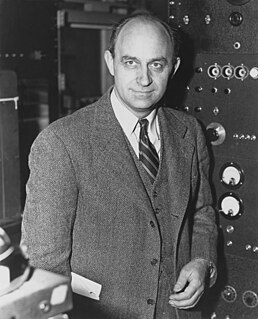
Enrico Fermi was an Italian physicist and the creator of the world's first nuclear reactor, the Chicago Pile-1. He has been called the "architect of the nuclear age" and the "architect of the atomic bomb". He was one of very few physicists to excel in both theoretical physics and experimental physics. Fermi was awarded the 1938 Nobel Prize in Physics for his work on induced radioactivity by neutron bombardment and for the discovery of transuranium elements. With his colleagues, Fermi filed several patents related to the use of nuclear power, all of which were taken over by the US government. He made significant contributions to the development of statistical mechanics, quantum theory, and nuclear and particle physics.
A future history is a postulated history of the future and is used by authors of science fiction and other speculative fiction to construct a common background for fiction. Sometimes the author publishes a timeline of events in the history, while other times the reader can reconstruct the order of the stories from information provided therein.
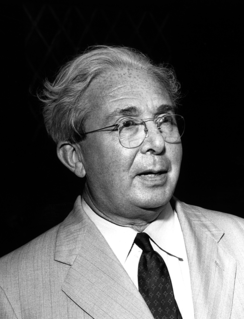
Leo Szilard was a Hungarian-German-American physicist and inventor. He conceived the nuclear chain reaction in 1933, patented the idea of a nuclear fission reactor in 1934, and in late 1939 wrote the letter for Albert Einstein's signature that resulted in the Manhattan Project that built the atomic bomb. According to György Marx, he was one of the Hungarian scientists known as The Martians.

Stephen Baxter is an English hard science fiction author. He has degrees in mathematics and engineering.
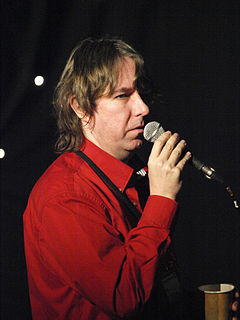
Alastair Preston Reynolds is a British science fiction author. He specialises in hard science fiction and space opera. He spent his early years in Cornwall, moved back to Wales before going to Newcastle University, where he read physics and astronomy. Afterwards, he earned a PhD in astrophysics from the University of St Andrews. In 1991, he moved to Noordwijk in the Netherlands where he met his wife Josette. There, he worked for the European Space Research and Technology Centre until 2004 when he left to pursue writing full-time. He returned to Wales in 2008 and lives near Cardiff.
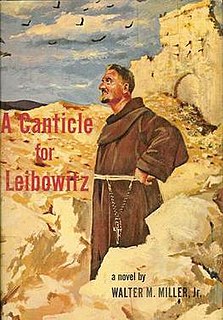
A Canticle for Leibowitz is a post-apocalyptic social science fiction novel by American writer Walter M. Miller Jr., first published in 1959. Set in a Catholic monastery in the desert of the southwestern United States after a devastating nuclear war, the book spans thousands of years as civilization rebuilds itself. The monks of the Albertian Order of Leibowitz preserve the surviving remnants of man's scientific knowledge until the world is again ready for it.

Strange and exotic weapons are a recurring feature in science fiction. In some cases, weapons first introduced in science fiction have been made a reality; other science-fiction weapons remain purely fictional, and are often beyond the realms of known physical possibility.

Chicago Pile-1 (CP-1) was the world's first artificial nuclear reactor. On 2 December 1942, the first human-made self-sustaining nuclear chain reaction was initiated in CP-1, during an experiment led by Enrico Fermi. The secret development of the reactor was the first major technical achievement for the Manhattan Project, the Allied effort to create atomic bombs during World War II. Developed by the Metallurgical Laboratory at the University of Chicago, CP-1 was built under the west viewing stands of the original Stagg Field. Although the project's civilian and military leaders had misgivings about the possibility of a disastrous runaway reaction, they trusted Fermi's safety calculations and decided they could carry out the experiment in a densely populated area. Fermi described the reactor as "a crude pile of black bricks and wooden timbers".
"Rescue Party" is a science fiction short story by English writer Arthur C. Clarke, first published in Astounding Science Fiction in May 1946. It was the first story that he sold, though not the first one published. It was republished in Clarke's second collection, Reach for Tomorrow (1956), and also appears in The Collected Stories of Arthur C. Clarke (2001).
The 44th World Science Fiction Convention (Worldcon), also known as ConFederation, was held on 28 August–1 September 1986 at the Marriott Marquis and Atlanta Hilton in Atlanta, Georgia, United States.

Herbert Lawrence Anderson was an American nuclear physicist who was Professor of Physics at the University of Chicago.
Romanian science fiction began in the 19th century and gained popularity in Romania during the second half of the 20th century. While a few Romanian science fiction writers were translated into English, none proved popular abroad.

Magic in Ithkar 2 is a shared world anthology of fantasy stories edited by Andre Norton and Robert Adams. It was first published as a trade paperback by Tor Books in December 1985. It was reprinted as a standard paperback in October 1988.

Swords and Ice Magic is a fantasy short story collection, first published in 1977, by American writer Fritz Leiber, featuring his sword and sorcery heroes Fafhrd and the Gray Mouser. It is chronologically the sixth volume of the complete seven volume edition of the collected stories devoted to the characters. It was first published in paperback format during July 1977 by Ace Books company, which reprinted the title numerous times through 1990; a later paperback edition was issued by Dark Horse (2007). It has been published in the United Kingdom by Mayflower Books and Grafton. The first hardcover edition was issued by Gregg Press during December 1977. The book has also been gathered together with others in the series into various omnibus editions; Swords' Masters (1990), Return to Lankhmar (1997), and The Second Book of Lankhmar (2001).
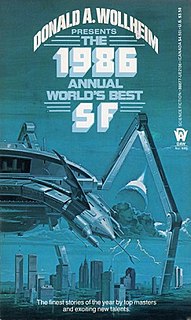
The 1986 Annual World's Best SF is an anthology of science fiction short stories edited by Donald A. Wollheim and Arthur W. Saha, the fourteenth volume in a series of nineteen. It was first published in paperback by DAW Books in June 1986, followed by a hardcover edition issued in August of the same year by the same publisher as a selection of the Science Fiction Book Club. For the hardcover edition the original cover art by Vincent Di Fate was replaced by a new cover painting by Ron Walotsky.

"The Fermi Paradox Is Our Business Model" is a science fiction short story by American writer Charlie Jane Anders. It was first published in the online magazine Tor.com August 11, 2010.
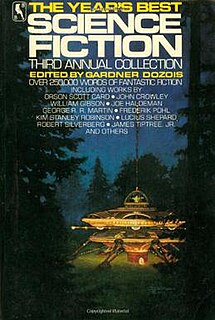
The Year's Best Science Fiction: Third Annual Collection is a collection of science fiction short stories edited by Gardner Dozois and published in 1986.

Armageddons is a themed anthology of science fiction short works edited by American writers Jack Dann and Gardner Dozois. It was first published in paperback by Ace Books in November 1999. It was reissued as an ebook by Baen Books in March 2013.
This page is based on this
Wikipedia article Text is available under the
CC BY-SA 4.0 license; additional terms may apply.
Images, videos and audio are available under their respective licenses.













